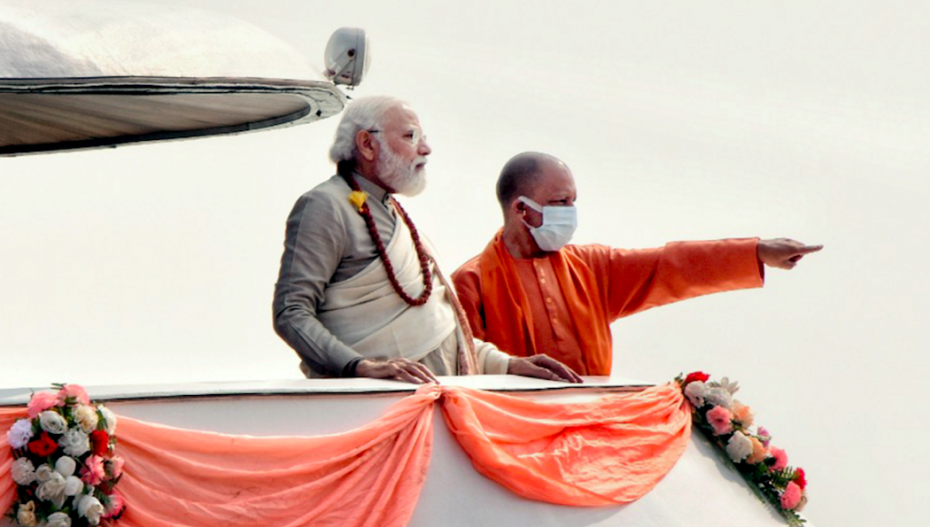The thrust on problems like unemployment, agrarian distress, and economic security in SP’s campaign stood in contrast to the BJP’s polarising canvassing along religious lines.
New Delhi: If there is one state which can single-handedly change India’s political direction, it is Uttar Pradesh. With a size bigger than many countries and a population as large as Brazil, Uttar Pradesh assembly elections are keenly watched.
The 2022 assembly polls, however, differed from its previous avatars because the ruling party contested the elections under the leadership of militant Hindu nationalist leader and chief minister Yogi Adityanath – a leader whose aggression in handling political and social matters drowned out dissent and multifarious criticisms emerging out of different corners of the state.
The saffron-robed chief minister’s perception as the most-polarising leader in the Sangh parivar pantheon came under intense scrutiny. But at the same time, his aggression consolidated a large chunk of hardcore Hindutva supporters who rebranded him as the best-suited icon to succeed Prime Minister Narendra Modi.
In the run-up to the polls, Samajwadi Party (SP) president Akhilesh Yadav emerged as his biggest challenger. He attempted to build a social coalition by going beyond the confines of his core support base of Muslims and Yadavs, and at the same time centred his campaign around immediate livelihood issues of an electorate that is still recovering from the economic impact of the pandemic.
The thrust on problems like unemployment, agrarian distress, and economic security in SP’s campaign stood in contrast to the Bharatiya Janata Party’s (BJP) polarising canvassing along religious lines. The polar-opposite campaigns made the electoral choice of the majority, which is reeling under economic duress, difficult, and question the hegemonising force that the BJP has become in UP.
In such a battle of wits, the non-BJP parties emerged as a strong opposition, and so did their supporters. Whether their spirit is enough to dislodge the BJP, which has formidable election machinery and grassroots-level organisational strength, will be known on March 10, Thursday.
Nonetheless, the opposition showed signs of a revival in facing the might of the saffron party. Most state ministers, including the deputy chief minister Keshav Prasad Maurya, appeared to be fighting tough elections. The last-minute flight of several OBC leaders like Swami Prasad Maurya or Dara Singh Chauhan from the BJP to SP also gave the party the additional impetus that Akhilesh Yadav desperately needed.
And, although Union home minister Amit Shah and BJP president J.P. Nadda claimed that their party ran a “scientific” campaign among targeted communities to get a majority vote, it was hard to miss that the BJP repeated most of its incumbent MLAs. Six months ago, several BJP leaders indicated that the party would drop at least 150 MLAs who are unpopular. However, when faced with stiff opposition, it couldn’t even drop 50 of them. The resentment against incumbency MLAs eventually gave a thrust to the SP and other parties.
Gradually, the elections became bi-polar, with those wanting to see Adityanath at the helm again rooting for yet another term for the BJP, and those seeking to remove him consolidating behind the SP-led alliance.
Both the camps depend hugely on their smaller allies which will be crucial for the incremental votes each of them gets. While the Nishad Party and Apna Dal (Sonelal) are expected to get the BJP support from the sizeable Mallah and Kurmi communities, SP’s allies Suheldev Bharatiya Samaj Party, Mahan Dal, Apna Dal (Kamerawadi), and Rashtriya Lok Dal are supposed to consolidate OBC groups Rajbhars, Nonia-Chauhans, a section of Kurmis, and Jats in favour of Akhilesh Yadav. Swami Prasad Maurya’s influence over the significant Kushwaha community may also play a crucial part in the outcome.
It would be remiss to not acknowledge the role of the year-long farmers’ agitations which set the tone for the opposition parties. Their fervent agitations foregrounded agrarian distress at the centre of state politics and became the root from which other economic issues emerged during the campaign. The agitational street politics of an otherwise affable Congress leader Priyanka Gandhi through the last two years also opened up space for the SP to come to its own.
As the outcome of the marathon seven-phase polls begin to come on Thursday, both the BJP and SP will be looking to consolidate their positions. The final electoral tally may appear to be a one-sided affair but it will belie the close contest that played on the ground for over three months.
Some of the important constituencies to look out for are:
Gorakhpur Urban: Chief minister Adityanath is contesting his maiden assembly elections from this seat.
Karhal: This is Akhilesh Yadav’s home seat.
Sirathu: Deputy chief minister Keshav Prasad Maurya is pitched against SP’s Pallavi Patel.
Thana Bhawan: 2013 Muzaffarnagar riot-accused and the state sugarcane minister Suresh Rana is seeking re-election from here.
Varanasi South: The home of Kashi Vishwanath corridor, the much touted PM’s project. The BJP is fighting a tough battle.
Zahoorabad: SBSP leader Om Prakash Rajbhar is up against BJP’s Kalicharan Rajbhar and BSP’s Shadab Fatima in a triangular contest.
Fazilnagar: Rebel BJP leader Swami Prasad Maurya is contesting as an SP candidate from this seat in Kushinagar district.













